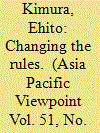| Srl | Item |
| 1 |
ID:
103187


|
|
|
|
|
| Publication |
2010.
|
| Summary/Abstract |
After more than three decades of military authoritarian rule, President Suharto resigned from office in May of 1998 and peacefully handed power over to his vice-president, B.J. Habibie. The ensuing period of transition can be characterised as a 'critical historical conjuncture', in that agents wielded a unusually large set of choices about the direction to take the country. This article explores this period, and examines both the roots of the historical conjuncture and its outcomes. It argues that long-term factors laid the foundations for change, but short-term factors shaped the timing and way the New Order would fall. It also argues that current outcomes attributable to the historical conjuncture include territorial resilience, a competitive electoral system, and paradoxically, elite entrenchment.
|
|
|
|
|
|
|
|
|
|
|
|
|
|
|
|
| 2 |
ID:
103641


|
|
|
|
|
| Publication |
2011.
|
| Summary/Abstract |
Indonesia in 2010 saw reformers face off against entrenched interests in a series of high-profile battles as President Susilo Bambang Yudhoyono began his second term in office. While there appeared little to threaten the formal institutions of democracy, corruption continued to be an endemic problem. The economy posted impressive gains, and Indonesia's reputation abroad appeared solid.
|
|
|
|
|
|
|
|
|
|
|
|
|
|
|
|
| 3 |
ID:
113920


|
|
|
|
|
| Publication |
2012.
|
| Summary/Abstract |
Corruption and political infighting continued to dominate the headlines in Indonesia in 2011. While lawmakers and political parties continued to be deeply unpopular, new developments dragged President Susilo Bambang Yudhoyono's popularity down to all-time lows. Religious violence ticked upward and took new forms. Meanwhile, the economy posted strong gains, and the government continued to look for ways to raise its profile on the international stage.
|
|
|
|
|
|
|
|
|
|
|
|
|
|
|
|
| 4 |
ID:
190036


|
|
|
|
|
| Summary/Abstract |
After another surge in cases, COVID-19 slowly receded from Indonesia’s foreground in 2022 as restrictions were lifted, schools and businesses reopened, and the economy rebounded. The Jokowi government posted several legislative victories while also testing the guardrails of democracy, for example with a public push to postpone the 2024 presidential elections. Corruption and misconduct grabbed global and national headlines and riveted the nation. In foreign policy, Indonesia chaired the G20 in a challenging year for the world economy and global politics.
|
|
|
|
|
|
|
|
|
|
|
|
|
|
|
|
| 5 |
ID:
099449


|
|
|
|
|
| Publication |
2010.
|
| Summary/Abstract |
What explains the recent internal territorial changes in the Indonesian archipelago? Given the relatively constant number of provinces and districts during the New Order period, the sudden rise of new districts and provinces in post-authoritarian Indonesia is puzzling. This article argues that the phenomenon is driven by multilevel alliances across different territorial administrative levels, or territorial coalitions. It suggests that national level institutional changes explain the timing of provincial proliferation and that the triggers can vary, depending on historical and cultural contexts.
|
|
|
|
|
|
|
|
|
|
|
|
|
|
|
|